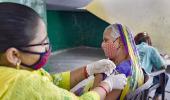'It is admitted that the AZ vaccine can, in very rare cases, cause TTS.'

The controversial AstraZeneca COVID-19 vaccine, which was banned by several countries across the globe after multiple cases of blood clots were reported in patients who were administered the jab, is back in the spotlight.
On Tuesday, April 30, 2024, British-Swedish multinational pharmaceutical and biotechnology company AstraZeneca, a prominent manufacturer of the COVID-19 vaccine, that was administered to millions of people around the world, specifically most in India, admitted for the first time in court documents that its vaccine, sold globally under the brand names Covishield and Vaxzevria, among others, may lead to a rare, deadly side effect: Thrombosis with Thrombocytopenia syndrome (TTS).
What is the new controversy?
In court documents submitted to a UK court in February, AstraZeneca stated that TTS can occur in very rare cases.
'It is admitted that the AZ vaccine can, in very rare cases, cause TTS. The causal mechanism is not known,' it said.
However, in the papers, it also said that even if there is no vaccination, TTS can happen, adding that expert testimony will be required to determine causation in every individual case.
The Cambridge-headquartered company now faces a class action lawsuit, which claims that its vaccine caused serious injuries and fatalities.

What is TTS
Thrombosis with Thrombocytopenia syndrome (TTS) is a rare but serious condition associated with certain COVID-19 vaccines, particularly adenovirus vector vaccines such as the AstraZeneca vaccine and Johnson & Johnson's Janssen vaccine.
TTS involves the formation of blood clots in combination with low platelet levels (thrombocytopenia).
The condition typically presents itself with blood clots occurring at unusual locations, such as the brain (cerebral venous sinus thrombosis) or abdomen, along with low platelet counts.
The symptoms of TTS include severe headache, blurred vision, difficulty speaking, chest pain, abdominal pain, shortness of breath, and leg swelling, among others.
TTS has been thought to result from an immune response triggered by the adenovirus vector used in the vaccines, which activates platelets and forms blood clots.
What is the AstraZeneca COVID-19 vaccine?
The AstraZeneca vaccine, also known as AZD1222 or Covishield in India, is a viral vector vaccine designed to protect against the SARS-CoV-2 virus, the causative agent of COVID-19.
It was developed through a collaboration between the University of Oxford and the British-Swedish pharmaceutical company AstraZeneca.
India's role in AstraZeneca vaccine development
Pune-based pharma firm Serum Institute of India entered into a strategic partnership with AstraZeneca and the University of Oxford in January 2021 to manufacture Covishield for India and other low- and middle-income countries.
The vaccine works by utilising a weakened version of a common cold virus (adenovirus) found in chimpanzees, modified to carry the gene for a protein from the SARS-CoV-2 virus.
Once injected, the vaccine prompts the human immune system to produce antibodies and activate T-cells to fight off the virus if the person is later exposed to it.

Distribution of Covishield in India
The distribution of Covishield in India has been facilitated through collaboration with the Government of India and various state governments, as well as through international partnerships such as COVAX, a global initiative aimed at equitable access to COVID-19 vaccines.
What were the side effects of Covishield?
The World Health Organisation lists the side effects of the AstraZeneca vaccine, including mild to moderate symptoms that are typically short-term and self-limiting.
Common side effects reported after receiving the vaccine were discomfort at the injection site, feeling generally unwell, tiredness, fever, headache, joint or muscle pain, swelling among others.

Where was the vaccine banned?
Denmark was the first country to suspend AstraZeneca's COVID-19 vaccine. Ireland, Thailand, The Netherlands, Norway, Iceland, Congo and Bulgaria soon followed suit.
European countries, including Germany, France, Italy and Spain, also stopped using AstraZeneca's COVID-19 vaccine in 2021 after multiple cases of blood clots were reported in patients who were administered the vaccine.
Canada, Sweden, Latvia and Slovenia joined the league in banning the use of the vaccine in the same year.
The vaccine was also banned in Australia, Indonesia and Malaysia.
Feature Presentation: Ashish Narsale/Rediff.com











 © 2025
© 2025